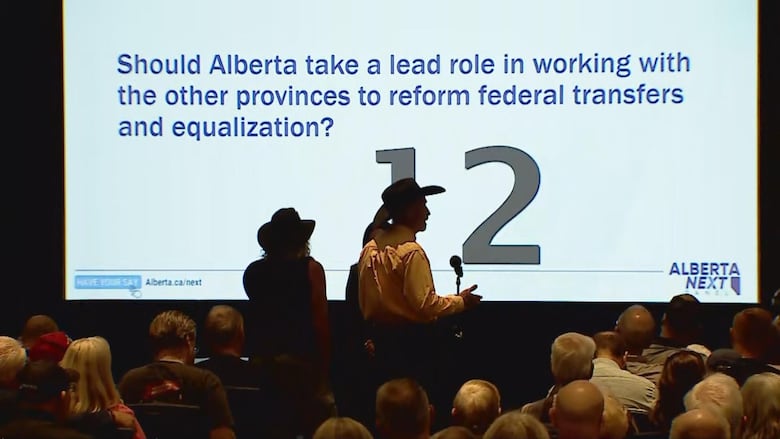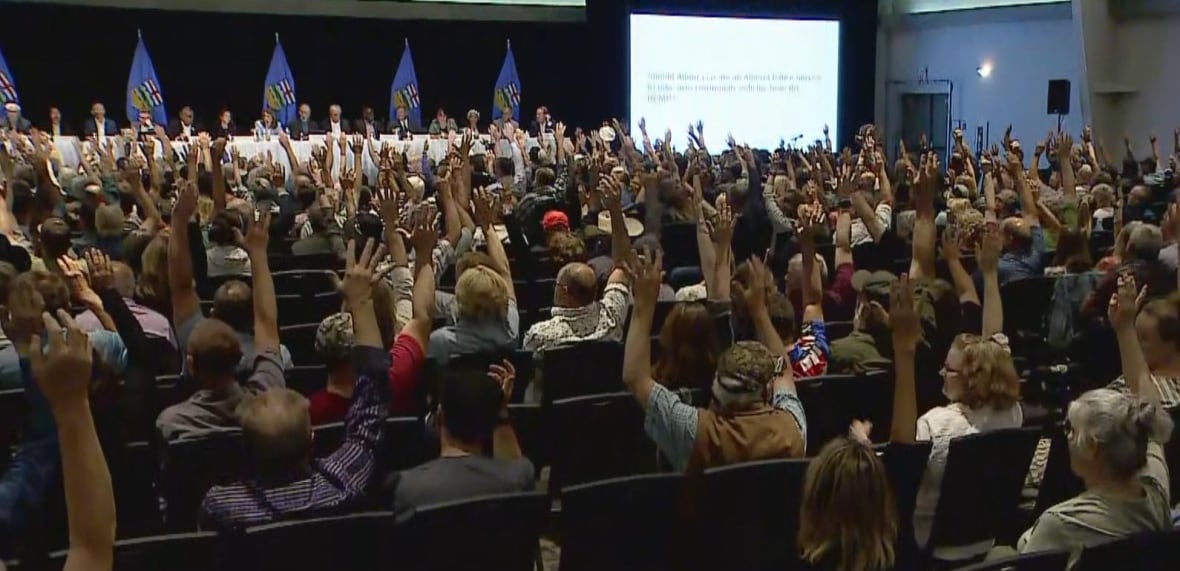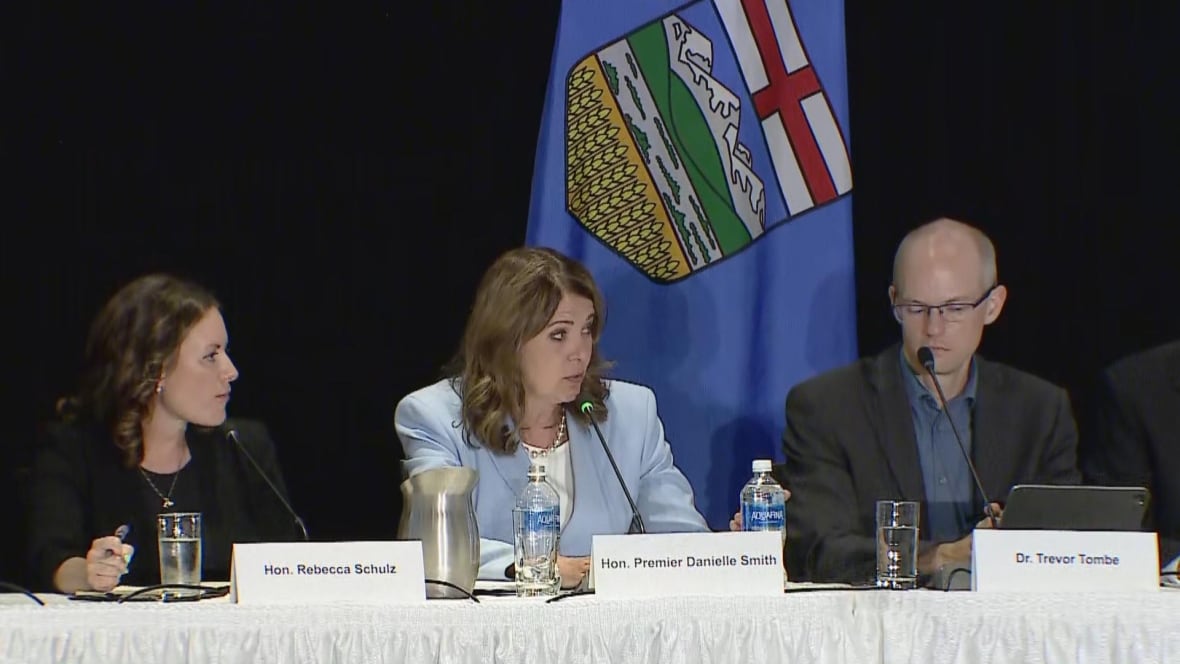Danielle Smith finds friendly, anti-Ottawa crowd at the Alberta Next town hall
Most Albertans oppose province-only pension, police force — both very popular ideas at this event

There's a routine backdrop at most of Alberta Premier Danielle Smith's news conferences: a row of provincial and Canadian flags, or at least one of each. Even when she's doing TV interviews from home on the weekend, the pair of flags are behind her — a red-and-white and a deep blue.
Her staff kept the Maple Leaf emblems at home for their road trip Tuesday to Red Deer, for the first Alberta Next panel on federal affairs.
Positioned behind Smith and her 15 fellow panellists were six flags, all ultramarine with the Alberta coat of arms.
This likely suited many in the crowd just fine. The roughly 450 attendees were heavily of the Alberta-first persuasion — not predominantly separatist, but certainly keen to withdraw the province from major Canadian institutions and Ottawa influence.
If that preference wasn't clear from speaker after speaker making those points, the premier got clarity on the meeting hall's bent. She requested a series of straw polls on an Alberta-only pension, police force and other proposals.
About three-quarters or more of the audience raised their hands in support on each question. The opponents were sparse in this central Alberta expo hall, next to where Red Deer's Westerner Days midway was set up to begin the next day.

Consider one attendee's hard line on equalization and transfers to less affluent provinces: "If my brother needs help, he can come with a business plan and ask for it. And Alberta should treat the other provinces the same."
That was the first speaker, but to say he set the tone would be inaccurate.
Smith's team chose to frame each topic by running the videos released last month on the Alberta Next website. They preceded the user surveys and suggested big economic benefits from quitting the Canadian Pension Plan and that to gain more of a handle on immigration, Alberta "withhold provincial social programs to any non-citizen or non-permanent resident who does not have an Alberta-approved immigration status" — a move that even the video acknowledged could provoke legal challenges.
The six videos and a longer introductory recording in which Smith declares Alberta has an "Ottawa problem" altogether took up more than 30 minutes of the two-and-a-half-hour event.
But that still left ample time for dozens of attendees to line up at the microphones and chime in with their agreement, arguments or questions for the panel.
There was even time for a self-identified communist to address the crowd — twice — and draw some of the crowd's loudest boos when he recommended nationalizing oil companies and installing workers as owners.
There were scattered boos, too, for pro-independence speakers, but far more cheers for demands for a separatist referendum, be it to actually leave or as political leverage for Alberta.
"If they do not know that we are serious and we can leave at any point in time, we will not ever get a pipeline to the Atlantic Ocean," someone from the Stettler area said. (Premier's staff urged journalists to stay at the media table and not wade into the crowd to speak with attendees, along with a restriction on news cameras and photography.)

Smith, as chair, frequently responded to audience questions. A few panellists did as well, notably retired judge Bruce McDonald, economist Trevor Tombe and energy executive Michael Binnion, a vocal advocate for more Alberta autonomy.
Other panellists had little to offer, including Environment Minister Rebecca Schulz and Business Council of Alberta president Adam Legge. They're both outspoken critics of federal energy and climate policies, but had little to offer on matters like equalization and an Alberta provincial police force; when the moderator prompted him, Legge said broadly his group liked the drive to "send a resounding message to Ottawa."
Bruce McAllister, the premier's aide who moderated the town hall, invited the panel's two doctors and a disability services provider to speak on immigration, because each had immigrated themselves.
On that issue, attendees roundly criticized the recent rise in immigration numbers and tied them to housing and employment issues, as the provincial video did as well. Nobody brought up its suggestion the government deny social services to certain immigrants, and Smith didn't ask for a straw poll on it.
Nor did she ask for a show of hands on an Alberta tax collection agency like Quebec has, given how many speakers said it made no sense if the province couldn't collect federal taxes too (which Quebec doesn't).
But when the talk came to constitutional reform, Smith was very intrigued by speakers' calls to reopen the Constitution with fellow premiers to rebalance influence toward Alberta and the West — she even suggested proposing a constitutional convention when premiers meet next week for their annual retreat.
Alberta's premier then asked aloud for others to jog her memory about what went awry with the Charlottetown Accord in the early 1990s. (In brief: it wooed western provinces with Senate reform but repelled them with "distinct society" status for Quebec; both regions' populace opposed the constitutional rewrite in a 1992 referendum.)
By the event's end, Smith's eagerness to reopen Canada's foundation document seemed to wane.
"We know that once you open that up, you could end up having provinces stuff a bunch of things in there that we would have to compromise too much in order to agree to," Smith said at the event's conclusion.
But she said she was struck by the room's strong support for Alberta quitting the RCMP and CPP, as Smith seeks potential referendum questions to put to the public next year, potentially alongside an activist-initiated vote on separation.
According to repeated polls, clear majorities of Albertans have opposed the same ideas that the Alberta Next town halls have embraced. An attendee from Lacombe said that the government's videos were skewing things further away from what average Albertans believe.
"These members cannot consider the findings of these meetings and the surveys as a true reflection of public opinion," he said.
The similarly intentioned Fair Deal Panel that then-premier Jason Kenney launched in 2019 also found that its town halls and surveys were dominated by people who wanted to erect institutional walls to defend against Ottawa.
But the Fair Deal team's final report also conducted public opinion research that found that outside the self-selected town hall and survey visitors, fewer Albertans felt the province was treated "very unfairly" or wanted to set up Alberta-only pension or police agencies.
Smith's office has said the Next process will also conduct additional polling on its target subjects on top of its earlier research.
It may be that the worlds within and beyond the Alberta Next meetings have even more contrasting world views. But there are nine more town halls to go, including Wednesday's in Edmonton, so Smith and her co-panellists are in for much more exposure to the town-hall mindset before they reckon what to do with this feedback.

